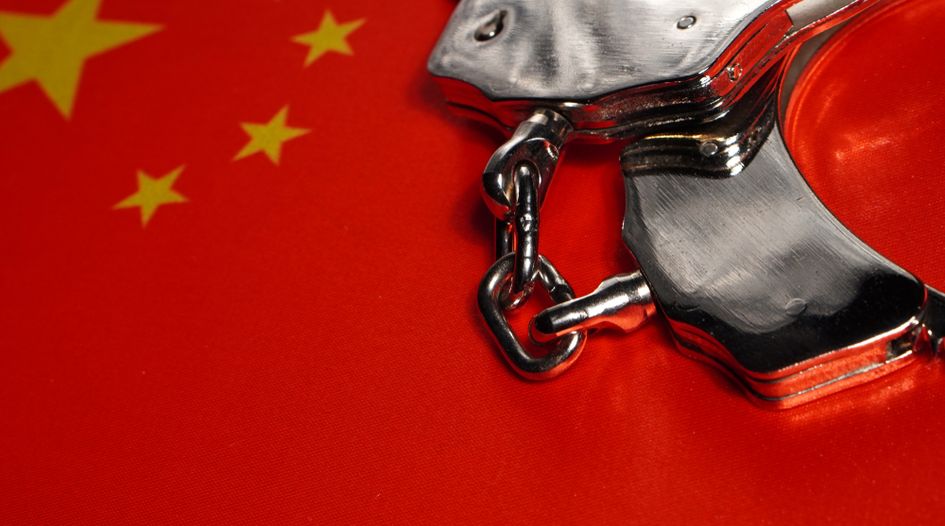China: Multi-pronged approach proves best fit to tackle rise in counterfeits

This is an Insight article, written by a selected partner as part of WTR's co-published content. Read more on Insight
Legal framework
With the proliferation of e-commerce and the platform economy, Internet sales in counterfeits from China have exploded in recent years. China is estimated to produce 80% of the world’s counterfeits,[1] and together with Hong Kong, accounted for 75% of the value of counterfeit and pirated goods seized by US Customs and Border Protection in 2021.[2] Continued growth in the counterfeiting industry is anticipated. In China’s legal system, the administrative bodies, the Public Security Bureau and the judiciary have overlapping authority to enforce against counterfeiting. While rights holders can choose which enforcement avenue to engage first, China is now further promoting the ‘three-in-one’ trial reform of intellectual property rights to improve collaboration and build a more comprehensive system of protection. This is a combination of (i) civil litigation, (ii) criminal investigation and litigation, and (iii) administrative investigation and prosecution.
Enhancement of IP laws and regulations on multiple levels
In recent years, China has placed specific emphasis on strengthening the nation’s IP infrastructure. In July 2023, the Inter-ministerial Joint Conference Office for the Implementation of the Intellectual Property Strategy of the State Council released the 2023 Outline for Building a Powerful Intellectual Property Nation and the Implementation Promotion Plan of the ‘14th Five-Year Plan’. This document puts forward a system for various departments to improve the IP system on multiple levels and sets out plans for joint efforts against infringement and counterfeiting.
In 2023, the Supreme People’s Court issued a decision to amend the Regulations of the Supreme People’s Court on Several Issues Concerning Intellectual Property Courts. Under this amendment, the Intellectual Property Courts may require parties to disclose the ownership, infringement, authorisation and confirmation of IP rights involved in their case and other related cases. If a party refuses to provide full and frank disclosure, this can be taken into consideration when determining whether it has followed the principle of good faith and whether its actions constitute an abuse of rights.
In June 2023, the State Administration for Market Regulation issued the Regulations on Prohibiting the Abuse of Intellectual Property Rights to Exclude or Restrict Competition. With the overarching aim of promoting competition and innovation and in line with Article 55 of the China Anti-Monopoly Law, these provisions prohibit the abuse of IP rights to exclude or restrict competition, such as by entering into monopolistic agreements or abusing a dominant market position. In March 2023, the State Intellectual Property Office issued the Notice on Issuing the National Intellectual Property Administrative Protection Work Plan for 2023. This sets out a plan to strengthen IP protection nationwide and build a world-class innovation and business environment. It specifies certain ‘key areas’ for strengthened protection, including overseas IP protection, IP in major events such as exhibitions and sporting competitions, and e-commerce platforms. It also calls for the promotion of public awareness of IP protection nationwide. The 2023 Guidelines for Assistance in Intellectual Property Rights Protection issued by the State Intellectual Property Office set out enhanced directions to IP rights protection assistance centres. There are currently over 1,300 of these assistance centres across the country. Volunteers from universities, research institutes and judicial agencies assist with IP issues and raise public awareness through hotlines, publicity activities and online rights protection platforms.
Strengthening administrative and judicial enforcement
In August 2023, the State Administration for Market Regulation issued the Opinions on Strengthening the Enforcement of Intellectual Property Rights in the New Era. This document addressed the latest trends in infringement and counterfeiting activities and highlighted certain focus areas for enforcement. It recognised that infringement is now increasingly characterised by online and offline integration and cross-regional operations, and set out measures to combat this. It emphasised online enforcement efforts and focuses on key markets and commonly counterfeited products including food and medicine, electronic products, household appliances, auto parts, clothing and bags.
Border measures
The General Administration of Customs facilitates the enforcement of IP rights in respect of imports and exports crossing the PRC border in accordance with the Regulations of the People’s Republic of China on Customs Protection of Intellectual Property Rights and related legislation. Customs tackles IP-infringing goods at the border, either on its own initiative (known as the ex officio protection model) or at the request of the rights holders (known as the passive protection model). In the latter case, right holders must provide intelligence to Customs for further investigation and consideration.
Ex officio protection
To benefit from ex officio Customs enforcement, rights holders must complete the Customs recordal process. Recordal is available for PRC trademarks; copyright works; and China National Intellectual Property Administration issued invention patents, utility models and design patents. A certificate of recordal is valid for 10 years and is renewable for a further 10-year period, provided that the subject IP right is still valid and subsisting.
Customs periodically inspects imported and exported goods and detains suspicious shipments. Upon the seizure of potentially infringing goods based on a corresponding IP recordal, Customs will notify the right holder by written notice (usually accompanied by photos of the suspected counterfeit goods), giving them a short period (generally within three working days) to confirm whether the goods are genuine or counterfeit. The rights holder is required to submit a signed affidavit to confirm the verification result. If the goods are found to be counterfeit and the rights holder demands Customs take seizure action, the rights holder is required to pay a security bond (proportionate to the value of seized goods, or it can be substituted by a general bank guarantee serving as a revolving bond arrangement). Customs will then initiate their investigation.
The time limit for the Customs investigation set out in the regulations is 30 working days from the date of seizure. In practice, this limit can be extended, so rights holders should communicate closely with Customs on progress. When the investigation is closed, Customs will make one of three determinations:
- the goods are infringing: the goods will then be confiscated, a fine will be imposed (NB: such a fine may be offset from the storage bond provided by the goods holder), and if the volume of infringing goods is large and reaches the criminal level, the case may be transferred to the Public Security Bureau for criminal prosecution;
- the goods are not infringing: the goods will be released and the storage bond (if so provided) will be refunded; or
- Customs is unable to determine whether the goods are infringing: Customs will release the goods if it does not receive any enforcement assistance notice from a People’s Court within 50 working days of the seizure.
Unlike most methods of law enforcement in which rights holders take the initiative, the ex officio protection model is wholly initiated by Customs. Statistically, over 90% of customs seizure cases are dealt with under this model.
Passive protection
Rights holders can also provide intelligence and investigative leads to Customs (such as goods and brand(s) involved as well as shipment details) and submit a request to Customs to seize imported or exported goods that are suspected of infringement. Upon seizure, the rights holder will have 20 days to file a lawsuit at the local People’s Court with respect to the suspected infringement. If Customs receives the Court’s notice of assistance in enforcement within this period, they will transfer the goods to the court; if not, they will release the goods. Customs recordal is technically not a pre-requisite for this enforcement route, but in practice, it is the only reliable way to get sustained support and protection from Customs.
Recent Customs operations
In 2023, Customs launched a series of special enforcement operations such as ‘Operation Dragon’ for comprehensive IP protection, ‘Operation Blue Net’ in respect of delivery channels and ‘Operation Clean Net’ in respect of exported transshipment goods. In 2023, Customs officials across the country seized 62,000 batches of suspicious imports and exports, comprising over 80 million individual items.
Criminal prosecution
The Public Security Bureau enforces against infringement and counterfeiting crimes severely, including in technical, public security, cultural and business fields. It establishes and improves working mechanisms such as intelligence reporting, case transfer and information sharing with administrative law enforcement departments.
Criminal offences set out in the Criminal Law include counterfeiting, the sale of goods bearing a counterfeited trademark and infringement of copyright with the purpose of making a profit. The Public Security Bureau will take into consideration the seriousness and scale of the activities in question when they launch criminal investigations and action. The national criminal prosecution service is led by the Supreme People’s Procuratorate. The benefits of criminal prosecution include the possibility of deterrent sentences such as fines and incarceration, the right of rights holders to initiate prosecution and potentially lower costs compared to civil litigation. There is a high incentive to comply with court orders, as China implements a social credit system that penalises judgment defaulters. Under the Supreme People’s Court’s Regulations Concerning Publishing Name List Information of Persons Subject to Enforcement for Trust-Breaking, if a person or corporation fails to “consciously implement” the obligations set out in legal documents (eg, a court order), their name may be put on the publicly available ‘List of Judgment Defaulters’. Various credit punishments may be imposed. For example, companies on the list may be prohibited from issuing shares, and individuals may be restricted from first-class rail and air travel. The purchase of products “not necessary for life or work”, such as private vehicles, may also be restricted. Parents on the list who have children attending high-fee schools may also be prohibited from using their personal assets to pay school fees.
Recent criminal cases
In 2023, public security organs filed and investigated 40,000 criminal cases of infringement of IP rights and the production and sale of counterfeit goods, including over 150 cases relating to technical fields. They cracked down on crimes such as patent counterfeiting and infringement of trade secrets, and investigated over 1,300 criminal cases involving pirated items such as books, movies and software.
In light of the ‘three-in-one’ trial reform of IP rights mentioned above, there is also a trend for local procuratorates to allow owners of IP rights being infringed to file a civil claim for damages against the accused. These will be determined at the criminal trial in order to save the time and costs of both parties and the judiciary.
Criminal action in respect of administrative and civil cases
If evidence of criminal activity surfaces in an administrative, civil or Customs case, it will be transferred to public security organs (such as the Ministry of Public Security) for criminal prosecution. Such a mechanism is expressly provided for in the Regulations of the Supreme People's Court on Several Issues Involving Suspects of Economic Crimes in the Trial of Economic Dispute Cases and the Regulations on the Transfer of Suspected Criminal Cases by Administrative Law Enforcement Agencies.
Civil enforcement
There are two branches of IP enforcement routes in China other than criminal prosecution, namely administrative action and civil litigation. The two channels can be engaged in sequence, generally following the order of (i) investigation, (ii) evidence preservation, (iii) administrative investigation and action, (iv) lawyer's warning letter, and (v) filing a civil lawsuit.
Administrative action
China’s administrative law enforcement system includes Customs and other administrative authorities.
The State Administration for Market Regulation (SAMR) regulates all commercial activities in China, including IP protection and enforcement. All business entities must register with a local branch of the SAMR, known as a Market Supervision Bureau (MSB), to obtain their business licence. MSBs generally have the power to conduct raids and seize counterfeit goods and associated production equipment.
Although MSBs have investigatory powers, in practice, they often do not have the resources to conduct in-depth investigations. Rights holders therefore usually engage private investigators to find out about the background and scale of the infringement, the source of the infringing products and the location of factories and warehouses. Once sufficient information has been uncovered, the rights holder can request the MSB to conduct an administrative raid. In trademark counterfeiting cases, the rights holder is required to produce the relevant trademark certificate(s) as proof of rights. If the application is accepted, MSB officials will go with the rights holder’s representative directly to the counterfeiter’s location. The MSB relies on the rights holder to verify the authenticity of any suspected infringing products. In a confirmed infringement case, the MSB will seize all infringing products and equipment used to produce such infringing products at the premises. It can order the infringer to stop their infringing conduct and pay a fine to the MSB.
The benefits of pursuing administrative enforcement through the MSBs include the relatively low cost, the easy accessibility and the possibility of obtaining prompt relief. The latter is particularly valuable as it is relatively difficult to obtain a pre-trial or interlocutory injunction through the Chinese courts. However, a major drawback is that the fines imposed are often so low that they rarely create a deterrent effect. Any fines imposed are paid to the MSB and not to the affected rights holders. Administrative relief is also geographically constrained in that any injunctions imposed are limited to the jurisdiction of the particular MSB involved.
Despite these drawbacks, administrative enforcement through the MSBs remains a popular option for brand owners. China’s market regulatory authorities dealt with more than 420,000 IP enforcement cases between January to September 2023, including 29,800 trade mark counterfeiting and patent infringement cases. About 19,800 enforcement actions were carried out against key physical markets with a high incidence of infringement and counterfeiting.
Civil litigation
Through civil litigation, rights holders can potentially obtain recourse through monetary compensation and permanent injunctions that are enforceable nationwide. The judiciary has become more robust in awarding monetary damages to indemnify both the IP owner’s financial losses and its enforcement costs. Civil IP cases can be heard at first instance by courts of the local province or municipality, Intermediate People’s Courts, or one of the specialist IP courts and tribunals. As of mid-2023, there were four IP courts (Beijing, Guangzhou, Shanghai and Hainan) and 27 cross-regional IP tribunals. Specialist IP courts generally have more sophisticated expertise in IP matters. They also have jurisdictions to review first-instance judgments made by basic-level courts in respect of copyright, trademarks and unfair competition within their territorial jurisdiction. Appeals on patents, technical secrets and computer software can be made to the National Appellate Intellectual Property Court within the Supreme People’s Court in Beijing. Appeals involving trademarks, non-software copyright cases or non-technical trade secrets are heard by municipal and provincial appeal courts.
According to the key data on judicial trial work released by the Supreme People's Court, 371,000 first-instance IP cases were accepted between January to September 2023, representing a year-on-year increase of 1.61%. Among them were 6,725 new cases involving computer software copyright infringement disputes, more than twice the volume of the previous year. China has placed an increased emphasis on the protection of technological IP rights. In 2023, the State Intellectual Property Office and the Ministry of Justice jointly issued the Opinions on Strengthening the Administrative Judgment of Patent Infringement Disputes in the New Era to strengthen the capacity of administrative adjudication of patent infringement disputes.
Other recent developments have also made it easier for foreign entities to participate in PRC litigation. China joined the Hague authentication system in November 2023, simplifying the authentication process for the use of foreign documents in PRC litigation. Now the documentary prerequisites can be satisfied through the apostille process completed in the document’s country of origin. Previously, each document had to undergo a certification process by a notary or other government organisation in the document’s country of origin, followed by legalisation by a Chinese embassy or consulate in the same country. The former process was often slow and expensive and carried a risk of documents being refused for legalisation at the embassy level.
With advances in technology, the cost of evidence preservation has been greatly reduced. More and more Chinese courts recognise time-stamped evidence as a supplement to notarised evidence. Further, several notaries in China now accept electronic notarisation too, through which online copyright works and websites can be stored on cloud storage through blockchain technology and notarised in a paperless manner.
Downsides to the civil litigation system include the higher costs (although these are still lower than in most jurisdictions around the world) and traditionally low damages awards. Counterfeiters often operate under false names and identities, absconding as soon as they are targeted. Though enforcement of court judgments is a lot easier than before and the overall rate of compliance with court orders is increasing, successful litigants sometimes still face difficulties in enforcing favourable judgments.
Civil litigation incidental to criminal offences
As mentioned above, China has been promoting the trial of both criminal cases and civil claims together. The judgment of the Xiong Sizhuan case, one of the Supreme People’s Court’s 50 Typical Cases of Judicial Protection of IP Rights in Chinese Courts published in 2021, clearly supported the concept that victims of IP crimes can file incidental civil lawsuits. It also laid down guidelines on the standard of proof that should be applied in these cases. In such instances, infringers may be more willing to settle and voluntarily pay compensation due to pressure from the criminal proceedings. At the same time, the court may view the defendant’s compensation payment as evidence of remorse and take this into account when sentencing.
Anti-counterfeiting online
Responsibilities of online platforms
Major Chinese online platforms offer online portals for IP rights holders to record their rights and file takedown requests. In the interest of maintaining a favourable business environment, China applies the ‘Safe Harbor Principle’ and the ‘Red Flag Principle’ to identify the responsibilities of online platforms in infringement cases. The Safe Harbour Principle dictates that where online infringement occurs, the platform does not bear any liability if it takes necessary measures in accordance with the law and promptly after receiving notice from the rights holder. Under the Red Flag Principle, platforms that choose to turn a blind eye to obvious infringements should bear legal liabilities. In recent years, China has been placing greater emphasis on the responsibility of platforms, and has become more wary of over-applying the ‘Safe Harbor Principle’.
In recent cases, the Chinese courts laid down the principle that if the platform fails to exercise reasonable care – failing to prevent further infringement when it ‘should have known’ – this will constitute contributory infringement, resulting in joint liability. Chinese courts have taken the approach that it is not appropriate to adopt overly stringent fixed standards in these cases, and that whether a platform operator has fulfilled its reasonable duty of care should be assessed holistically. The court will typically consider whether the platform has: (i) established a complaint and reporting mechanism, (ii) promptly taken action after receiving an infringement report and (iii) actively assisted rights holders in safeguarding their rights.
Video e-commerce and copyright issues
The proliferation of the short-form video and livestreaming e-commerce industries has changed the way that brands engage and sell to Chinese customers. It has also led to a rise in associated copyright disputes. In these cases, injured parties are rarely sufficiently compensated for their losses through damages awarded by the Chinese courts. As IP rights are intangible, it can be difficult to establish a causal relationship between loss and infringement. Often the compensated amount does not cover or is otherwise disproportionate to the costs of investigation and enforcement. In response, China is currently exploring a licensing mechanism to promote win-win cooperation in the long and short-form video content industries. It is exploring the possibility of an online copyright licensing cooperation model, either through sharing agreements between collaborating parties or through the intervention of a collective copyright management organisation.
Preventive measures and strategies
The following strategies are generally recommended to enhance the protection of IP rights in China:
Lay a solid foundation for rights protection by properly managing and maintaining IP rights portfolios
It is advisable to select certain product lines for targeted IP protection. These can be the most counterfeited products or the most representative brands. It is also useful to review past cases of infringement and assess whether any gaps can be filled by additional IP rights applications (eg, if a trademark filing is blocked by a bad faith trademark registration, try to secure copyright registration, if possible, for some form of protection first before you manage to invalidate the bad faith trademark registration, which may take years if the squatter is defensive). Consider also how best to structure and present each application; for example, in a copyright registration, consider the form of the application and the selection of samples.
Regularly monitor third-party trademark registration applications
China adopts the first-to-file principle, though the government has recently proposed significant amendments to the PRC Trade Mark Law with a strong focus on use requirements. It is important to spot suspicious or bad faith trademark applications and oppose them in good time. Suspicious trademark applications can also be clues to potential infringement. Once such applications are found, it is worthwhile conducting internet searches and investigations to assess whether there is any malicious intent behind them, and to seek appropriate legal advice as needed.
Maintain industry awareness
In this fast-changing world, it is important to stay abreast of industry updates, get connected with the local IP or brand protection associations and maintain close working relationships with local administrative departments and Customs. This can be helpful when deciding on the best avenue for IP rights enforcement.
Embrace data analytics
Data analytics can be deployed to collect data from e-commerce platforms and to monitor infringement patterns, including parallel imports. The data that is collected may also be used to facilitate online IP enforcement work and can even be presented as evidence of infringement proceeds in civil and criminal cases.
Connect and cooperate with online platform operators
Before entering the Chinese e-commerce market, rights holders should negotiate with their chosen platforms and agree on an overall brand protection strategy. For example, they may agree on the platform’s responsibility to conduct regular monitoring, clean up infringing posts or provide dedicated contact channels.
Endnotes
[1] ‘How to create a robust anti-counterfeiting programme’, World Trademark Review, 3 October 2023, https://www.worldtrademarkreview.com/guide/anti-counterfeiting-and-online-brand-enforcement/2023/article/how-create-robust-online-anti-counterfeiting-programme/.
[2] https://ustr.gov/sites/default/files/2023-01/2022/Notorious-Markets List (final).pdf.







